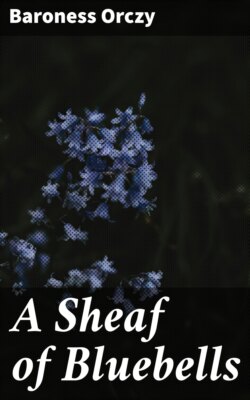Читать книгу A Sheaf of Bluebells - Baroness Orczy - Страница 23
На сайте Литреса книга снята с продажи.
2
ОглавлениеTable of Contents
After that the conversation drifted to other subjects. Laurent remained morose until the end of dinner and Fernande made no effort to cheer him up. In the late afternoon she wandered out into the open. The garden was a mere tangle of weeds and overgrown shrubs; there were neither lawns nor parterres, but it smelled good of fresh earth and spring rains, of wet young leaves and opening blossom.
Fernande had slipped a coarse gardening apron over her white gown and, gardening tools in hand, she set to work to disentangle a fragrant hedge of hawthorn and lilac from a mass of encroaching weeds. Despite the sorrowful outlook in her young life, despite the cares and heavy thoughts which weighed upon her father and her friends and kindred—almost despite herself—she felt singularly gay and elated. It was not the fashion to be merry in the circles of these émigrés who had just returned to their devastated homes, through the clemency of the Corsican usurper; tempers had to be sober and looks demure. The cause of the King had to be fought again; thoughts of danger, of conspiracy and self-sacrifice—aye! even of crime—all in a just cause—were in the air. Women, men, young girls and boys were prepared to shed the last drop of their blood in order to restore the Bourbons to their heritage, even though the nation had ceased to want them, and to oust from his self-constituted throne the soldier of fortune—the Emperor, who to many was still the little corporal, and who was the idol of France.
These aims were so high and so serious, that levity appeared out of place. Mme. la Marquise never smiled, M. de Courson was a pattern of seriousness, Laurent was ofttimes self-absorbed and always thoughtful, and Fernande—when her natural gaiety, her youth and healthful spirits caused inward laughter to bubble up and a song to rise to her throat—would take refuge in the tangled garden and share her joy in life with the birds.
She was fond of the solitude, the quietude of those avenues of limes, wherein the call of mating birds alone disturbed the silence that reigned around. Fernande was very young still—little more than a child, scarce out of the school-room, wherein the only lesson of life which she had learned was that of loyalty to a degenerate cause, of sacrifice to ideals and political aims which she really was far too inexperienced thoroughly to understand. Her heart was full of the aspirations of a healthy young being who sees life lying a rose-coloured dream stretched out before her, of a desire for a happiness at which she could only vaguely guess, for joy and gaiety, for poetry and for beauty. And it was full, too, of that vague longing for love which stirs the sensibilities of every woman the moment she steps across the threshold of childhood. But of this Fernande de Courson was no more conscious than is the rose-bud when it opens its sweet-scented corolla to the kiss of the sun. Ever since her fair curls had been dressed to the top of her head she had looked on Laurent de Mortain as her future husband. Never in so many words had she plighted her troth to him, but she knew that she loved him with a tenderness that no other emotion in her could surpass. He was so handsome, and his voice had a delicious tremor in it when he spoke her name. No other man had touched her heart as he did, no words of love spoken by other lips—and she had heard many—had caused the same delicious blush to rise to her cheeks. She was never so gay as when, hand in hand, with Laurent, she could wander through the peaceful lanes of Devonshire in far-off England, even though the shadow of poverty and of exile had already darkened her young life. She was never so happy as when Laurent sat or knelt beside her, and in impassioned tones spoke to her of the future, when the sombre cloud of anarchy and rebellion would be lifted from fair France, and he and she together would enjoy the delights of repatriation, of home and comfort and peace.
Yet in spite of all this, in spite of her deep love for Laurent and her delight in his company, Fernande on this late afternoon of early May was conscious of a slight feeling of impatience when she suddenly spied him coming towards her from the terrace. Her head was so full of exciting and riotous thoughts that she longed for solitude so that she might co-ordinate them. The project which she had so boldly formulated a while ago of bringing Ronnay de Maurel back to heel like a repentant cur, had of a certainty been the result of impulse, but not of a thoughtless one. It had its origin in the flash from his dark eyes as they met hers for one second across the uplifted arm of a would-be fratricide. During that one second Fernande, with that swift intuition which some women possess, had read each varying emotion as it became reflected in their depths: wrath, puzzlement, bewilderment—then that gradual softening of the sinister scowl, the changing hue of the orb from black to a deep violet, the look of self-consciousness and of shame. Fernande had seen the pathetic and furtive glance cast on the stained blouse and the toil-worn hands; she had seen the stealthy grasp of that bit of crimson ribbon, the one brief flash of pride wherewith the outraged soldier clasped the insignia of glory to his breast.
And from out that one peep into a man’s troubled soul Fernande had woven her project of winning him to the cause which was so dear to her heart.
